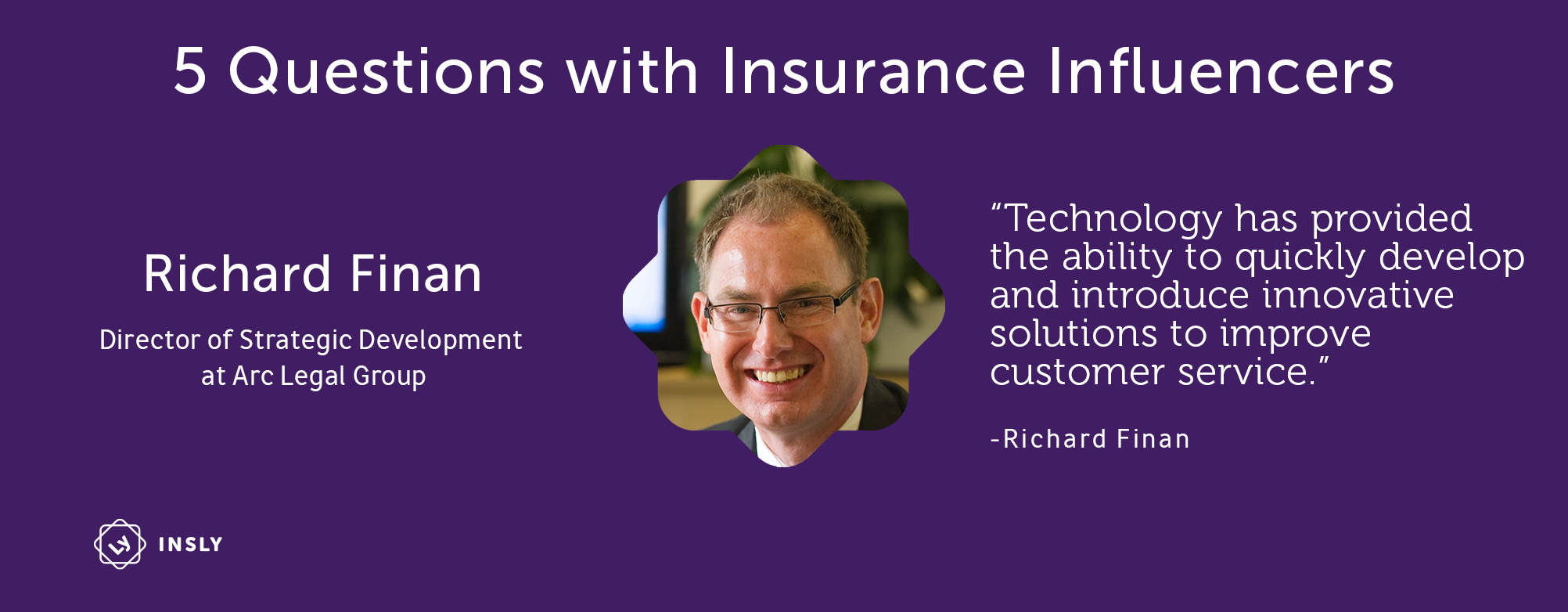We interviewed Richard Finan, the Director of Strategic Development at Arc Legal Group.
Speaking of challenges that lie ahead, Richard says that underwriting capacity has been a big issue for many MGAs, particularly over the past two years as the market has hardened. Despite this, the specialist knowledge required to build and service niche solutions is the greatest value that MGAs bring to the wider market. Technology also plays an important role for MGAs and has allowed Arc Legal to quickly develop and introduce innovative solutions to improve customer service and enable their partners to see how products are performing for their customers.
Have a read and find out Richard’s point of view on our questions about the MGA business.
Is every MGA’s dream to become an Insurer themself?
Not at all! As an MGA, we have complete flexibility of underwriting, so if a class doesn’t fit one Insurer’s risk appetite, we can move to another Insurer. It helps to operate a panel of Insurers, as we do at Arc Legal Group, which we can match to our clients’ specific risk appetite.
The MGA space is thriving at the moment, and our size and agility mean that we can offer levels of service that many Insurers can’t, with a laser focus on niche classes of business that gives us an edge in a busy market.
What is the biggest challenge of running an MGA?
Underwriting capacity has been a big challenge for many MGAs, particularly over the past two years as the market has hardened.
Markets can change their risk appetite, despite the performance of your own book; this can sometimes be as a result of experiences they’ve had in other jurisdictions, but it does introduce an element of vulnerability to the MGA model.
However, running clean books of business, sustainably priced and designed to provide high value to customers, will always make an MGA attractive to other Insurers. Having a strong panel of Insurers in place, as we do, also helps here.
What is your view on why an MGA is a value-adding player in the insurance value chain, not just an unnecessary intermediary that adds to the final cost of insurance?
The purpose of a ’true’ MGA is to provide Insurers with the ability to participate in markets in which they have limited in-house experience. If we look at the ancillary market for instance, not many core Insurers know how to write or service these products. However, they add a great deal of value to their core offering. The specialist knowledge required to build and service niche solutions is therefore the greatest value that MGAs bring to the wider market.
What is the greatest benefit that embracing technology has provided for your MGA?
The ability to quickly develop and introduce innovative solutions to improve customer service. We’ve revolutionised the ways in which customers can access their products by introducing digital channels and a range of ways for them to get advice and submit a claim. The ancillary market was behind the curve in comparison to general insurance, but we’ve learned a lot from them and are now forging ahead to meet our customers’ ever-changing needs.
We’ve also invested heavily in technology to enable our partners to clearly see how our products are performing for their customers. This investment has paid dividends in light of the FCA’s recent Value Measures initiative, allowing us to quickly respond to our partners’ and Underwriters’ additional data requirements to meet their regulatory obligations.
Where would you suggest a person who wants to establish an MGA to start finding a capacity provider? What other challenges lie ahead on that journey?
In the UK and with Rated Insurers. There are still distribution chains that run the gauntlet of using off-shore, unrated paper which is frustrating. However, corporate partners are now far more selective about underwriting security, and those in it for the long term will take a more cautious approach.
One big challenge for a start-up MGA is that Insurers are increasingly actuarial, rather than Underwriter-led, and as such want granular data to inform their risk appetite and pricing. This is challenging for start-ups, as they will have no legacy data that they can (legally) provide. The underwriting market is therefore limited to Insurers that have their own experience in the class of business that the MGA is going to write. If your risk management model is radically different, however, and of course you would expect it to be better, an Insurer’s legacy data isn’t necessarily helpful, but can at least provide a starting point for discussion.
About
One of the founding members of Arc Legal Assistance back in 2003, Richard Finan has over 30 years of experience in the Legal Expenses Insurance and assistance markets. Their vision was to modernise this area of the market and launch a unique new business model to streamline the claims process and create a robust, effective risk management framework.
Now as the group’s Director of Strategic Development, Richard has a strong focus on business growth and has overseen the strategic expansion of the group in recent years as new lines of business have been introduced, and partnerships formed with some of the UK’s leading insurance businesses and affinity groups.
Today, Arc Legal Group is a one-stop shop for ancillary products and services, providing over 23 million policies and servicing over 45,000 claims each year.
Stay tuned for more insurance influencer stories! Don’t forget to check out interviews with Scott Brown, Hugo Barker, Andreas Nemeth, Marco Del Carlo, and Hedi Mardisoo.



